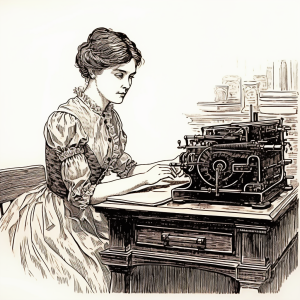CHAPTER IV.
INTERESTING ANTECEDENTS.
It may be of interest to English readers to know something concerning my countrywomen who have made a sensation during a London season. Many of them are unknown, or at least
unrecognised, by the best American society.
Take Miss Porkolis, for example, the Western girl whom Lady —— spoke of having chaperoned. Her grandfather was interested in the lard business, and who her great-grandfather was history sayeth not. The present Mr. Porkolis has retired to a country house and lives on his income.
When Miss Porkolis was introduced to London society she was even in a worse state than I represented myself to be; for not only were the members of her family unrefined and
uneducated, but the young lady herself made the most startling blunders in grammar and spelling. No wonder that Lady , in considering my proposition, made the proviso that I myself must be possessed of some refinement and education. She was doubtless thinking of the many embarrassments she suffered during the career of Miss Porkolis !
There were the Cole-Kings, two sisters, chaperoned by a well-known social star. Both were beautiful, fascinating, and wealthy. They were from the Wild West, but were educated in an Eastern seminary, and then sent to a “finishing school” to be polished off. The polishing process lasted over two years; and then, after a vain attempt to number themselves among the New York “Four Hundred,” they made a trip over the Continent, and turned up in London in time for the festivities of the season.
The Diamondsons came over en famille, and entertained magnificently in London not a dozen years ago. Everybody went to their ” crushes,” because with them money seemed to be no object. In speaking of the British and American monetary system one time, Mr. Diamondson was heard to remark that, although he generally thought in dollars, he would just as soon pay out pounds as dollars, as it was simply a matter of multiplication by five anyhow. So when Miss Evelyn Diamondson wanted a dress from Messrs. Swagger and Swell, it made no difference to her adoring father whether it cost one hundred dollars or one hundred pounds. It was, then, not surprising that, with all their recklessness as regarded the expenditure of money, the Diamondsons became immensely popular. Their daughter almost married a man of high degree in England, and then quite married a titled foreigner — a harmless sort of person, who
contentedly spends the income allowed him by his father-in-law.
I could give a long list of my recently Anglicised countrypeople who in England are mistakenly
looked upon as fair specimens of America’s best citizens. There are the Snobsons, of wheat farm fame; the Candlemans, who grew opulent on the proceeds of their tallow and fat business ; and the Welldiggers, who awoke one morning to find themselves millionaires, one of the “hired men” having “struck oil” on the outskirts of the farm after the rest of the family had gone to bed.
Mr. Welldigger took the hired man into partnership, and proposed that he should marry Angelica, his only daughter. But Angelica positively declined, having made up her mind to cross the ocean and marry a title, which she did, and greatly to her credit too, for never a girl fished harder with gilded bait than did Angelica.
The prevalence of French names and hyphens among the signatures of rich Americans has often been remarked upon. About the first thing that occurs to a man with newly-acquired wealth and social aspirations is to make some sort of change in his name, if it happens to be an unfashionable one, which is often the case. If Patrick Rafferty becomes a millionaire by a sudden speculation, either he or his wife will immediately discover that the family is really of French origin, and that the name should be pronounced Raffertay, with the accent on the last syllable; while if Luther Jones determines to attempt to scale the social ladder in London, he will have new cards engraved, which will read thus : “Mr. Luther-Jones.” Then the French “de ” is also quite popular among our would-be aristocrats, and such names as “de Brown ” and “de Smithers ” are considered quite the thing for a family about to make a European trip.
And yet, ” what’s in a name ?” So far as society is concerned, the daughters of the men I have mentioned would have experienced no difficulty in finding chaperons to introduce them in London even if their names had been plain Jones or Smithers, so long as they paid the price, which I have discovered is made according to the advantages offered.
So, after all my investigations, my faith in the purchasing power of the ” Almighty Dollar” still remains unshaken.




